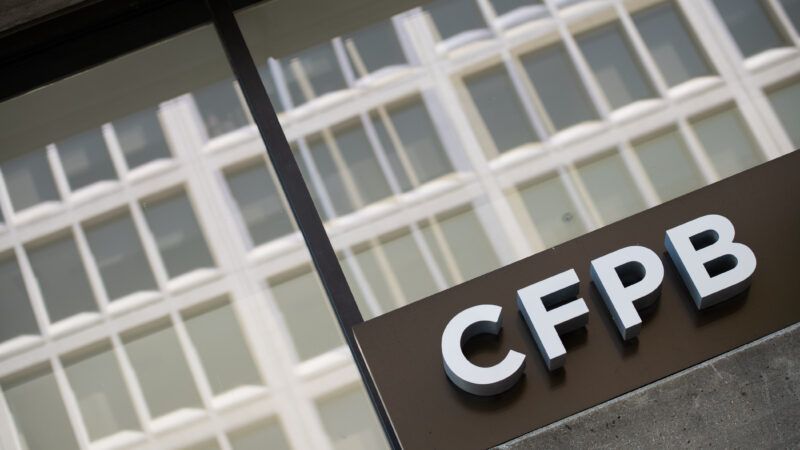Consumer Financial Protection Bureau
Why the Consumer Financial Protection Bureau's Funding Structure Is Unconstitutional
The Fifth Circuit Court of Appeals is right to notice that the CFPB is unique even among federal agencies that don't get their funding from Congress.

When the Consumer Financial Protection Bureau (CFPB) was created as part of the massive Dodd-Frank banking regulation bill in 2010, it was given a funding structure unlike that of any other federal regulatory agency.
That unique structure, it turns out, is also unconstitutional.
A three-judge panel on the 5th Circuit Federal Court of Appeals ruled this week that the CFPB's structure is unconstitutional because Congress has no control over the agency's budget, which is funded entirely by the Federal Reserve. Under the terms of Dodd-Frank, the CFPB is entitled to receive a budget totaling up to 12 percent of the Federal Reserve's annual operating expenses, and the Federal Reserve is not allowed to refuse the CFPB's requests for funding.
"Congress's decision to abdicate its appropriations power under the Constitution, i.e., to cede its power of the purse to the Bureau, violates the Constitution's structural separation of powers," Judge Cory Wilson wrote in this week's ruling.
At issue in the case before the 5th Circuit was a 2017 rule issued by the CFPB that affected payday lending companies. The judges invalidated that rule, despite noting that the agency did not overstep its authority in issuing it. Rather, they found that "without its unconstitutional funding, the Bureau lacked any other means to promulgate the rule."
That's an outcome that opens up bigger questions about the constitutionality of everything the CFPB is charged with doing. In short, even if the agency has the authority to regulate wide swaths of the financial sector, it cannot do so until Congress adjusts its funding mechanism to comport with the constitution.
"This is a victory for accountability, as our Constitution's structure encourages political accountability by giving Congress a powerful lever—decisions about funding—to influence the behavior of unelected bureaucrats," Devin Watkins, an attorney for the Competitive Enterprise Institute, a free market think tank that's long been critical of the CFPB's regulatory agenda, said in a statement.
It's the latest blow to the CFPB's structure, which was designed to insulate the agency from political influence—making it effectively unaccountable.
In 2016, a three-judge panel at the U.S. Court of Appeals for the District of Columbia ruled that the CFBP's unelected and largely unaccountable director must be able to be fired by the president. "Indeed, other than the President, the Director of the CFPB is the single most powerful official in the entire United States Government, at least when measured in terms of unilateral power," wrote Judge Brett Kavanaugh, who would later be appointed to the Supreme Court, in that ruling.
This week's ruling is a deeper cut to the CFPB's power. Even as she criticized the ruling as "lawless and reckless," Sen. Elizabeth Warren (D–Mass.), acknowledged in a series of tweets that the courts were "throwing into question every rule the CFPB enforces."
But that's exactly what should happen when a federal agency is blatantly—and by design—violating the fundamental rules for how the federal government is supposed to operate. That is exactly the role of the court system.
But don't tell that to some critics of this week's ruling, like Vox legal correspondent Ian Millhiser, who described the 5th Circuit's ruling as relying "on a novel reading of an obscure provision of the Constitution."
That "obscure provision" is Article I, which gives Congress the sole authority over setting the budgets of federal agencies. And the "novel reading" is, well, the plain text of Article I, which gives Congress the sole authority over setting the budgets of federal agencies.
Millhiser also parrots the talking point of CFPB spokesperson Sam Gilford, who told Politico that the ruling ignores the fact that several other federal agencies are funded outside of the annual appropriations process, including the entire Federal Reserve system and agencies like the Federal Deposit Insurance Corporation and the Federal Housing Finance Agency.
But the CFPB made exactly that argument to the 5th Circuit, and the court dismissed it as being a comparison that "mixes apples with oranges."
"Congress did not merely cede direct control over the Bureau's budget by insulating it from annual or other time-limited appropriations. It also ceded indirect control by providing that the Bureau's self-determined funding be drawn from a source that is itself outside the appropriations process—a double insulation from Congress's purse strings that is 'unprecedented' across the government," Wilson wrote in the court's ruling. "Even among self-funded agencies, the Bureau is unique. The Bureau's perpetual self-directed, double-insulated funding structure goes a significant step further than that enjoyed by the other agencies on offer."
So, no, the CFPB is not like other federal agencies that are funded independently of Congress' purview. It has a wholly unique structure, one that is finally getting the constitutional scrutiny it deserves.


Show Comments (30)